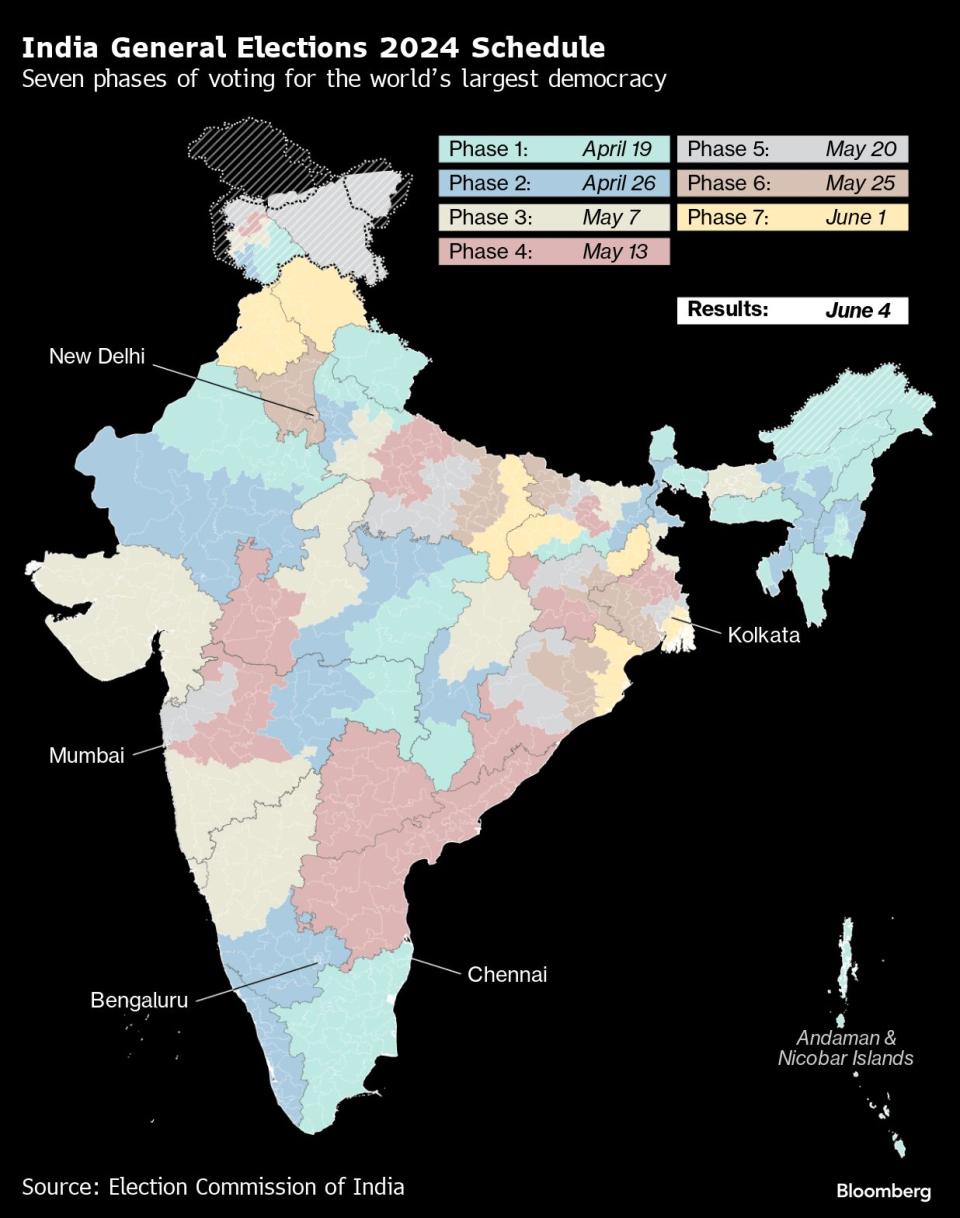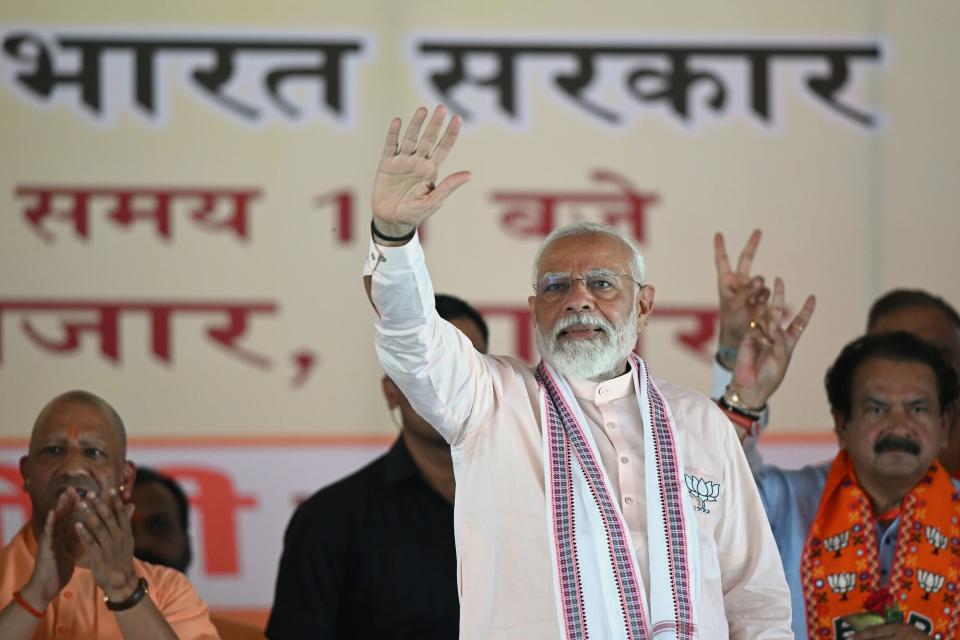India Inheritance Tax Dominates Election Debate as Polls Heat Up
(Bloomberg) -- Sign up for theIndia Edition newsletter by Menaka Doshi – an insider's guide to the emerging economic powerhouse, and the billionaires and businesses behind its rise, delivered weekly.
Most Read from Bloomberg
Musk Makes Surprise China Visit in Search of Tesla Revenue Boost
Elliott Said to Have Built ‘Large’ Stake in Buffett-Favored Sumitomo
Blade to Offer Luxury Bus Service to Hamptons at Fare Up to $275
India’s election campaigning this week was overtaken by a heated debate around wealth redistribution and an inheritance tax, with Prime Minister Narendra Modi seeking to exploit fears in a country where income inequality is among the highest in the world.
In daily election rallies stretching from Rajasthan state to West Bengal, Modi claimed the main opposition party, the Indian National Congress, will take wealth away from those who have it and give it to their support base of minority groups, which includes some of country’s lowest castes and tribes. The opposition party has denied the allegations and say Modi and his Bharatiya Janata Party are misstating the pledges made in its manifesto.
In recent days, the debate has centered around an inheritance tax after a Congress official based in the US, Sam Pitroda, gave an interview highlighting the US’s tax as an example of a redistributive policy to tackle inequality. Modi and BJP leaders have since latched onto the comments as evidence of the opposition’s plans, even though the Congress party has said Pitroda was speaking in his personal capacity and not giving the party’s official view.
India began its second phase of voting Friday in an election that will run until June 1. Results are due June 4. Modi is widely expected to win a third consecutive term in power, with his party making a bold prediction it will win 400 of the 543 parliamentary seats with its allies.
Modi said at a rally on Thursday in Uttar Pradesh — the electorally important state where the BJP dominates — the opposition would take away 55% of an individual’s wealth after the death of their parents and grandparents.
“You will get what is left over,” Modi told the crowd of supporters. “Tell me, will you allow the hard work of your parents be stolen away like this?” Modi asked, to which the crowd shouted “no” in response.
Finance Minister Nirmala Sitharaman also weighed into the debate on Friday, saying an inheritance tax “directly hits the middle class, it directly hits the aspirational class.” These are groups that “work hard and the sweat and toil of theirs is saved in small savings here and there,” she told reporters after casting her vote in Bengaluru.
The Congress party’s election manifesto pledges to undertake a comprehensive survey to determine the socio-economic conditions of lower caste groups and strengthen its affirmative action policy. It doesn’t mention wealth distribution or inheritance tax.
Inheritance taxes were abolished in India in 1985 by a Congress-led government at the time. While many countries, including the US, UK, Japan and others impose taxes on inheritance, economists say it’s not necessarily appropriate in a country like India where per-capita income levels are already low as it may discourage wealth growth.
“Apart from negative wealth and consumption effect of the rich cohort on the economy, the administrative feasibility, net revenue benefit for public services and more importantly, social implications may not be a net gain for the economic system as a whole,” said Madhavi Arora, an economist at Emkay Global Financial Services Ltd.
Inheritance carries significance across much of India, especially in marriage, where women are often gifted gold jewelry. Land and property are also prized and passed through families from one generation to the next.
Modi’s attacks against the opposition this week have also been described by opposition groups and other critics as discriminatory against Muslims, the country’s largest minority group that makes up about 14% of the population.
The Election Commission of India has issued a notice to the BJP president asking for a response to complaints filed by the opposition against Modi. The commission also told campaigners to set high standards of political discourse and observe the rules of campaigning.
Sudhir Kapadia, a tax expert at EY India, said while it’s a good thing that tax policy is being discussed in politics, an inheritance tax wouldn’t be suitable for India.
“Inheritance tax is levied in developed nations where the stock of wealth has reached a particular point,” he said. “So first countries like India have to reach that stage.”
--With assistance from Ruchi Bhatia, Anup Roy and Shruti Srivastava.
Most Read from Bloomberg Businessweek
Biden Strategy to Tame Gas Prices Is in Peril as Iran Sanctions Pressure Mounts
Caught Between the US and China, a Powerful AI Upstart Chooses Sides
US White-Collar Job Growth Stalls, Even in Pandemic Boomtowns
How North Korea’s Man in the West Ran Afoul of US Authorities
How a Massive Hack of Psychotherapy Records Revealed a Nation’s Secrets
©2024 Bloomberg L.P.





